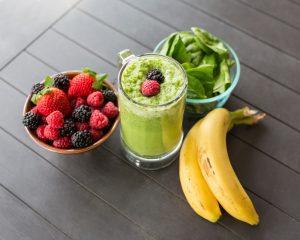Your diet is an important part of your health, whether you’re pregnant or not. But it’s especially important to recognize how your diet affects pregnancy – from prenatal through postpartum.
Every diet should include a balance of protein, carbohydrates and fat – filled with plenty of vegetables and fruits ensuring we’re getting the most out of a plant-based diet.
Unfortunately, that’s not always reality as most people consume a highly refined diet.
But the moment a woman plans to become pregnant or discovers she’s pregnant – a flip is switched and suddenly what she eats matters. A full diet overhaul may not happen, but more care is taken in the choice of foods and beverages eaten or avoided, and scrutiny goes into choosing the best prenatal vitamin for her body.
Nothing can beat a diet built around whole food. Let’s dive into just how your diet affects pregnancy, from conception through the time baby arrives.
How Your Diet Affects Pregnancy
A Diet Rich In Folate
Very often, when a woman first learns she’s pregnant, she begins to take a prenatal vitamin. That prenatal vitamin will always contain something called folic acid or folate. Folate, or vitamin B9, is naturally occurring in foods and folic acid is its synthetic counterpart.
It’s never a good idea to take excessive folic acid, but it would be hard to overdo folate in whole foods diet.
Folate or folic acid is an important nutrient to have in your body before conception, and in greater amounts after conception. A diet with an adequate amount of folate or folic acid has been shown to prevent neural tube defects, such as spina bifida.
Folate is good to have in our diets at any time in our lives. But if you think you might become pregnant, just learned your pregnant, try loading up on these foods to help support your folate needs:
- Spinach
- Avocado
- Beets
- Brussels Sprouts
- Eggs
- Asparagus
- Peanuts
- Lentils
- Peas
- Oranges
- Bell Peppers
- Cantaloupe
A Diet Rich in Iron
When a woman is pregnant, her blood supply increases quite a bit to accommodate the other person who is beginning to grow inside of her. All of that blood is rich with oxygen that helps to keep her feeling energized. The vehicle that’s responsible for transporting all that oxygen is called hemoglobin, a protein in our blood that’s made available by iron.
Iron is essential to a pregnant woman’s body because it helps to move oxygen-rich blood (via hemoglobin) to all the major organs and muscle tissue. As her body begins to grow, she may lack red blood cells due to a lack of iron in her diet. Without iron, hemoglobin can’t move oxygen, which leads to all the symptoms related to anemia.
One way to help avoid this is by getting enough iron, usually though a prenatal vitamin.
Iron-rich foods can also help.
There are two types of iron we can consume: heme and non-heme.
Heme iron is found in fish, poultry and meats and is derived from hemoglobin. It’s usually more easily absorbed by the body that its non-heme counterpart.
Good sources of heme iron include:
- Beef Liver
- Chicken Liver
- Sardines
- Ham
- Turkey
- Chicken
Non-heme iron is derived from plant-based foods. Non-heme foods aren’t absorbed as easily by the body, but are a good alternative to a healthy diet, especially if the mom-to-be is vegan or vegetarian.
Good sources of non-heme iron include:
- Oatmeal
- Beans
- Lentils
- Nuts
- Seeds
- Tomato Paste
- Dried Apricots
- Prune Juice
- Olives
- Quinoa
A Diet Rich in Protein
Every woman should think of her pregnancy as the greatest workout of her life – from beginning to end. We all know that every workout needs protein. Unfortunately, 98% of women have below normal protein levels throughout their pregnancy, which extends into her postpartum period.
Eating foods that are rich in protein, or supplementing with a high quality protein powder are two of the easiest ways to add protein back in.
There’s no need for a pregnant woman to drastically change her diet to accommodate her protein needs. An additional serving or two of highly absorbable protein is all that she should need to maintain more optimal energy, strength, as well as a healthy, happier postpartum period.
Good whole food-based varieties of protein include:
- Chicken breast
- Turkey
- Lean ground beef
- Beans and rice
- Lentils and rice
- Hummus (chickpeas + tahini)
- Cottage Cheese
An excellent food-based supplement that provides pregnant and postpartum women with easily absorbed protein is Protiva.
Protiva Pregnancy is a combination of nutritious collagen protein and a blend of nutrients that women need throughout their pregnancy.
Similar to Protiva Pregnancy, Protiva New Mom combines collagen with a different blend of nutrients needed for women after they give birth.
The Popeye: a combination of folate + iron + protein in one.
One of the easiest ways to get nutrition in one spot is by blending delicious and healthy ingredients into a smoothie. Here’s a great recipe we wanted to share with you!
The Popeye
Spinach is a great source of fiber, calcium, magnesium and more. Even though this shake probably won’t give you muscles like Popeye, it is a pocket rocket of a drink, packed with nutrients to help you keep healthy.
INGREDIENTS
1 scoop Protiva Pregnancy or Protiva New Mom
8-10oz Unsweetened Almond Milk
1 cup spinach
1 cup frozen mixed berries
1/2 frozen banana
INSTRUCTIONS
- Peel the banana and freeze it overnight, or longer.
- Chop the spinach and put it in the blender, along with all the other ingredients.
- Mix until smooth.
- Enjoy

